The latest podcast in the Health Research Futures series comes from Professor Julie Lovegrove. Professor Lovegrove is from the University of Reading and talks about the challenges of conducting nutritional research and overcoming them.
Latest research and knowledge exchange news at Bournemouth University
The latest podcast in the Health Research Futures series comes from Professor Julie Lovegrove. Professor Lovegrove is from the University of Reading and talks about the challenges of conducting nutritional research and overcoming them.
Before agreeing to participate in your study, your participants should receive all the information they require in order to make an informed decision. Once they wish to participate, then an informed consent form should be completed and filed appropriately.
Although the process sounds complex, there are currently a great training opportunities to help familiarise yourself with the background to, and process of informed consent in clinical research.
The Wessex Clinical Research Network are hosting the following training sessions at University Hospital Southampton and at Wessex CRN’s office –
If you’re interested in attending, get in touch with the Wessex CRN to book your place.
Are you interested in running your own research project within the NHS or healthcare? Good Clinical Practice, or ‘GCP’, is a requirement for those wishing to work on clinical research projects in a healthcare setting.
GCP is the international ethical, scientific and practical standard to which all clinical research is conducted. By undertaking GCP, you’re able to demonstrate the rights, safety and wellbeing of your research participants are protected, and that the data collected are reliable.
The next GCP full day session is scheduled for Tuesday 17th March, at Dorset County Hospital, Dorchester – 8:45am – 4:30pm.
The day will comprise of the following sessions:
If you’re interested in booking a place, please contact Research Ethics.
Remember that support is on offer at BU if you are thinking of introducing your research ideas into the NHS – email the Research Ethics mailbox, and take a look at the Clinical Governance blog.

NERC introduced demand management measures in 2012. These were revised in 2015 to reduce the number and size of applications from research organisations for NERC’s discovery science standard grant scheme. Full details can be found in the BU policy document for NERC demand management measures available here.
As at January 2020, BU has been capped at one application per standard grant round. The measures only apply to NERC standard grants (including new investigators). An application counts towards an organisation, where the organisation is applying as the grant holding organisation (of the lead or component grant). This will be the organisation of the Principal Investigator of the lead or component grant.
BU process
As a result, BU has introduced a process for determining which application will be submitted to each NERC Standard Grant round. This will take the form of an internal competition, which will include peer review. The next available standard grant round is July 2020. The deadline for internal Expressions of Interest (EoI) which will be used to determine which application will be submitted is 27th March 2020. The EoI form, BU policy for NERC Demand Management Measures and process for selecting an application can be found here: I:\RDS\Public\NERC Demand Management 2020.
NERC have advised that where a research organisation submits more applications to any round than allowed under the cap, NERC will office-reject any excess applications, based purely on the time of submission through the Je-S system (last submitted = first rejected). However, as RDS submit applications through Je-S on behalf of applicants, RDS will not submit any applications that do not have prior agreement from the internal competition.
Following the internal competition, the Principal Investigator will have access to support from RDS, and will work closely with Research Facilitators and Funding Development Officers to develop the application. Access to external bid writers will also be available.
Appeals process
If an EoI is not selected to be submitted as an application, the Principal Investigator can appeal to Professor Tim McIntyre-Bhatty, Deputy Vice-Chancellor. Any appeals must be submitted within ten working days of the original decision. All appeals will be considered within ten working days of receipt.
RDS Contacts
Please contact Lisa Andrews, RDS Research Facilitator – andrewsl@bournemouth.ac.uk if you wish to submit an expression of interest.
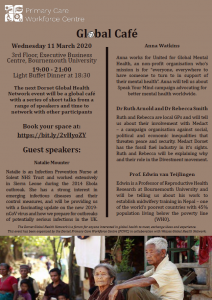 The next Global Café will be on Wednesday 11 March 2020 at the third floor of BU’s Executive Business Centre, It starts at 18.30 with a light Buffet Dinner followed by a series of short talks at 19.00. These short talks will be from a range of four speakers and there will be time to network with other participants. We aim the finish at 21.00.
The next Global Café will be on Wednesday 11 March 2020 at the third floor of BU’s Executive Business Centre, It starts at 18.30 with a light Buffet Dinner followed by a series of short talks at 19.00. These short talks will be from a range of four speakers and there will be time to network with other participants. We aim the finish at 21.00.
All welcome, please book your space here!
Dr. Emer Forde
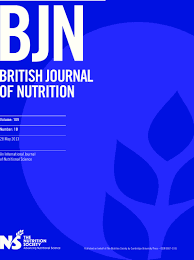 In the last month we had several FHSS-Psychology success stories. The first one was a recently accepted joint publication between Mr. Paul Fairbairn and Dr. Fotini Tsofliou in the Department of Rehabilitation and Sport Sciences, Dr. Andrew Johnson in BU’s Department of Psychology. The joint paper is called ‘Effects of a high DHA multi-nutrient supplement and exercise on mobility and cognition in older women (MOBILE): A randomised semi-blinded placebo controlled study” in the British Journal of Nutrition [1].
In the last month we had several FHSS-Psychology success stories. The first one was a recently accepted joint publication between Mr. Paul Fairbairn and Dr. Fotini Tsofliou in the Department of Rehabilitation and Sport Sciences, Dr. Andrew Johnson in BU’s Department of Psychology. The joint paper is called ‘Effects of a high DHA multi-nutrient supplement and exercise on mobility and cognition in older women (MOBILE): A randomised semi-blinded placebo controlled study” in the British Journal of Nutrition [1].
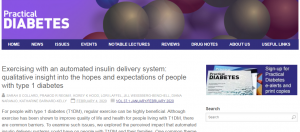
Secondly, Dr. Sarah Collard in the Department of Psychology, Dr. Pramod Regmi in the Department of Nursing Science and FHSS Visiting Professor Katherine Barnard-Kelly are to be congratulated on their publication: ‘Exercising with an automated insulin delivery system: qualitative insight into the hopes and expectations of people with type 1 diabetes’ [2].
 And last, but not least, Dr. Bibha Simkhada in the Department of Nursing Science together with FHSS colleagues Dr. Michele Board and Prof. Edwin van Teijlingen and Dr. Shanti Shanker in the Department of Psychology were awarded £17,180 in the most recent internal GCRF call. Their proposed project ‘The key issues in Dementia in South Asia’ will run from 2020-2021. Both Dr. Simkhada and Dr. Shanker are Global Engagement Lead (GEL) in their respective departments.
And last, but not least, Dr. Bibha Simkhada in the Department of Nursing Science together with FHSS colleagues Dr. Michele Board and Prof. Edwin van Teijlingen and Dr. Shanti Shanker in the Department of Psychology were awarded £17,180 in the most recent internal GCRF call. Their proposed project ‘The key issues in Dementia in South Asia’ will run from 2020-2021. Both Dr. Simkhada and Dr. Shanker are Global Engagement Lead (GEL) in their respective departments.
Good to see so many great cross-BU collaborations!
Professor Edwin van Teijlingen
CMMPH
References:
Fairbairn, P., Tsofliou, F., Johnson, A., Dyall, S.C. (2010) Effects of a high DHA multi-nutrient supplement and exercise on mobility and cognition in older women (MOBILE): A randomised semi-blinded placebo controlled study, British Journal of Nutrition (accepted).
Collard, S.S., Regmi, P.R., Hood, K.K., Laffel, L., Weissberg-Benchell, J., Naranjo, D., Barnard-Kelly, K. (2020) Exercising with an automated insulin delivery system: qualitative insight into the hopes and expectations of people with type 1 diabetes, Practical Diabetes 2020; 37(1): 19–23.
All email addresses at the HRA are changing in the coming weeks and this change will be complete by March 2020.
HRA staff email addresses will be standardised as firstname.lastname@hra.nhs.uk. A full list of contact email addresses for the Research Ethics Committees is now available here.
If you use the HRA staff member’s @nhs.net email address to contact them after they have moved to their new email address, you will receive a response containing their new details but your email won’t be automatically forwarded.
If you are unsure which contact information to use for the individual or service you require, please contact the HRA mainline on 020 797 22545 or use their contact form.
Make sure to check your junk mail if you are expecting emails from the HRA or an NHS REC as they often are sent there instead. Please add them to your safe senders list if this is the case to make sure you don’t miss any important study emails!
Are you interested in running your own research project within the NHS or healthcare? Good Clinical Practice, or ‘GCP’, is a requirement for those wishing to work on clinical research projects in a healthcare setting.
GCP is the international ethical, scientific and practical standard to which all clinical research is conducted. By undertaking GCP, you’re able to demonstrate the rights, safety and wellbeing of your research participants are protected, and that the data collected are reliable.
The next GCP full day session is scheduled for Tuesday 17th March, at Dorset County Hospital, Dorchester – 8:45am – 4:30pm.
The day will comprise of the following sessions:
If you’re interested in booking a place, please contact Research Ethics.
Remember that support is on offer at BU if you are thinking of introducing your research ideas into the NHS – email the Research Ethics mailbox, and take a look at the Clinical Governance blog.
Are you currently undertaking research within the NHS, and your Good Clinical Practice (GCP) training is due to expire? Or has it expired recently?
GCP certification lasts for two years, so if your training is due to expire, has expired, or you want to validate your learning, then take advantage of the upcoming refresher half day session, taking place at Dorset County Hospital, Dorchester on Tuesday 18th February, 9:00am – 12:30pm.
Spaces are still remaining, so if you’d like to enrol, get in touch with Research Ethics.
The NIHR have recently released another of their podcasts in their Health Research Futures series, this time from Professor Martin Rosser.
Professor Rosser founded Join Dementia Research, a national system for linking patients and public to research studies. He is also the Director of the NIHR Clinical Research Network for Dementia and Neurodegenerative diseases.
In this podcast he discusses dementia research and its importance in the clinical research landscape.
The Royal College of Physicians have recently published a set of articles that reflect the crucial role clinical research plays in the NHS.
This article comes from a Consultant Gastroenterologist at the Royal Wolverhampton NHS Trust in which he talks about the transformational effect that clinical research had on his career.
You can see the article here.
Remember – support and guidance is on offer at BU if you are thinking of conducting clinical research, whether in the NHS, private healthcare or social care – get in touch with Research Ethics. You can also take a look at the Clinical Governance blog for resources and updates.
Happy reading!
SoECAT stands for the ‘Schedule of Events Cost Attribution Tool’ – either a SoECAT or a Schedule of Events (SoE) is required whenever you are conducting clinical research in the NHS or Social Care. Further information and clarification is provided below.
*Where there is no external funding attached to a project, the Schedule of Events should be used instead of a SoECAT.
Remember – support and guidance is on offer at BU if you are thinking of conducting clinical research, whether in the NHS, private healthcare or social care – get in touch with Research Ethics. You can also take a look at the Clinical Governance blog for resources and updates.
Two new links have been added to the Clinical Governance blog under the ‘Useful Links and Documents’ section which give further information and guidance as to attending an NHS Research Ethics Committee meeting for your project. The links are also provided below-
Remember – support and guidance is on offer at BU if you are thinking of conducting clinical research, whether in the NHS, private healthcare or social care – get in touch with Research Ethics. You can also take a look at the Clinical Governance blog for resources and updates.
On Tuesday 11th February, Research Development & Support are running a 2 hour workshop to give an overview of the National Institute for Health Research (NIHR), Clinical Research Networks and the NIHR ‘portfolio’.
This workshop is designed to raise awareness of the benefits of the NIHR’s portfolio of research studies to BU and NHS partners. It will also explore the role of the NIHR Clinical Research Networks (CRN), with an emphasis on the set-up and work of our local network, Wessex.
The workshop will cover the requirements to be eligible for the NIHR portfolio, how to apply so that your study may be considered for adoption, and how to access the support of the NIHR CRN.
By the end of this workshop you will have an understanding about:
If you’re interested in attending then reserve your place via Organisational Development.
On Tuesday 4th February, Research Development & Support are running a 2 hour workshop on the standards of Good Clinical Practice. If you’re running your own clinical research, or are planning to in the future then this workshop is for you.
This workshop is designed to ensure that Researchers are equipped to conduct clinical research in accordance with the international standard.
The workshop will cover other standards and regulations, roles in clinical research, participant eligibility and data collection, safety reporting and closing down your study.
By the end of this workshop you will have an understanding about:
If you’re interested in attending then reserve your place via Organisational Development.
Two resources are now available on the NIHR Learn website for researchers –
To access the above resources you will need to have access to the NIHR Learn website. Once you have an account select the tab ‘Health Research Innovations’ and then click on ‘NIHR Endorsed Learning’. Both courses are free and do not require an enrolment key.
Remember – support and guidance is on offer at BU if you are thinking of conducting clinical research, whether in the NHS, private healthcare or social care – get in touch with Research Ethics. You can also take a look at the Clinical Governance blog for resources and updates.
An exciting opportunity to attend a workshop, please see below for further details –
‘A team from the National Institute for Health Research (NIHR) are working on a project looking at how we recruit research study participants from commercial High Street health care providers (e.g. Boots, SpecSavers etc), or organisations that support health in some way (e.g. gyms, slimming clubs etc).
The project is titled Community-Based Research and we are looking to answer two specific questions:
These two groups could miss out on research opportunities currently because they don’t come into the standard health system until they are either considered to be too severe for High Street treatment (in the case of group 1) or they already have a health problem (in the case of group 2). We are looking to develop a process by which we can actively recruit participants at scale for trials before they need to access the health service, thus enabling better recruitment of milder disease and pre-disease phenotypes. We are aware that research is happening in these two groups and would like to pull together researchers who have this experience in order to learn from their successes and challenges.
To support this ETI we are running a workshop on January 31st, 10.30-3.30, at The Wesley Euston Hotel & Conference Venue, London, which will bring together the research community to discuss:
a) Examples of how we currently recruit from these settings, identifying successes and challenges
b) Based on these, identifying the key elements of a recruitment strategy that the Clinical Research Network could use
We would like to invite researchers to attend if this would be of interest. Please could nominated representatives complete this Eventbrite registration page (https://www.eventbrite.co.uk/e/nihr-crn-community-based-research-event-tickets-83954384825) including indicating which Specialty they are representing.’
 For nearly a decade BU researchers have published widely about the hazards and risk of Nepali migrant workers in Asia and the Middle East [1-9]. Despite the fact that most migrant workers end up in semi-skilled and unskilled jobs in their host countries, only a minority report poor working environments. For example, in Pratik Adhikary’s PhD study in FHSS only just over a fifth of migrant workers reported that their work environment in the Middle East or Malaysia was poor or very poor [4]. This relatively high level of satisfaction appears to seems contradict reports in local media on the risks associated with Nepali migrants working abroad, especially focusing on the football world cup in Qatar [7], official reports that many hundreds of bodies of dead Nepali migrants return home every year [10], and the fact that many of these Nepali migrant workers end up doing the jobs the local populations finds too dirty, dangerous and demeaning (colloquially referred to as 3D-jobs). Why do so many who travel abroad take to do risky, dirty and otherwise undesirable jobs, but still assess their working environment as not too bad?
For nearly a decade BU researchers have published widely about the hazards and risk of Nepali migrant workers in Asia and the Middle East [1-9]. Despite the fact that most migrant workers end up in semi-skilled and unskilled jobs in their host countries, only a minority report poor working environments. For example, in Pratik Adhikary’s PhD study in FHSS only just over a fifth of migrant workers reported that their work environment in the Middle East or Malaysia was poor or very poor [4]. This relatively high level of satisfaction appears to seems contradict reports in local media on the risks associated with Nepali migrants working abroad, especially focusing on the football world cup in Qatar [7], official reports that many hundreds of bodies of dead Nepali migrants return home every year [10], and the fact that many of these Nepali migrant workers end up doing the jobs the local populations finds too dirty, dangerous and demeaning (colloquially referred to as 3D-jobs). Why do so many who travel abroad take to do risky, dirty and otherwise undesirable jobs, but still assess their working environment as not too bad?
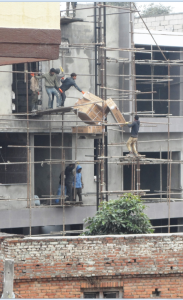 More theoretical papers on the drivers of migration have referred to many interconnected factors and links [11-12]. Local drivers in Nepal include poverty, lack of employment opportunities, having a history of work-related migration, a growing culture of migration (i.e. it becomes more or less an expectation) and many more. One local element that is perhaps too easily ignored is that many Nepali migrant workers would have ended up in dirty, dangerous and demeaning jobs at home too. And the risk, on for example building sites in Nepal might be even greater than that in Qatar or elsewhere in the Middle East as some of the photos below illustrate. These photos of an accident involving an external building lift were taken today on a building site in Kathmandu.
More theoretical papers on the drivers of migration have referred to many interconnected factors and links [11-12]. Local drivers in Nepal include poverty, lack of employment opportunities, having a history of work-related migration, a growing culture of migration (i.e. it becomes more or less an expectation) and many more. One local element that is perhaps too easily ignored is that many Nepali migrant workers would have ended up in dirty, dangerous and demeaning jobs at home too. And the risk, on for example building sites in Nepal might be even greater than that in Qatar or elsewhere in the Middle East as some of the photos below illustrate. These photos of an accident involving an external building lift were taken today on a building site in Kathmandu. 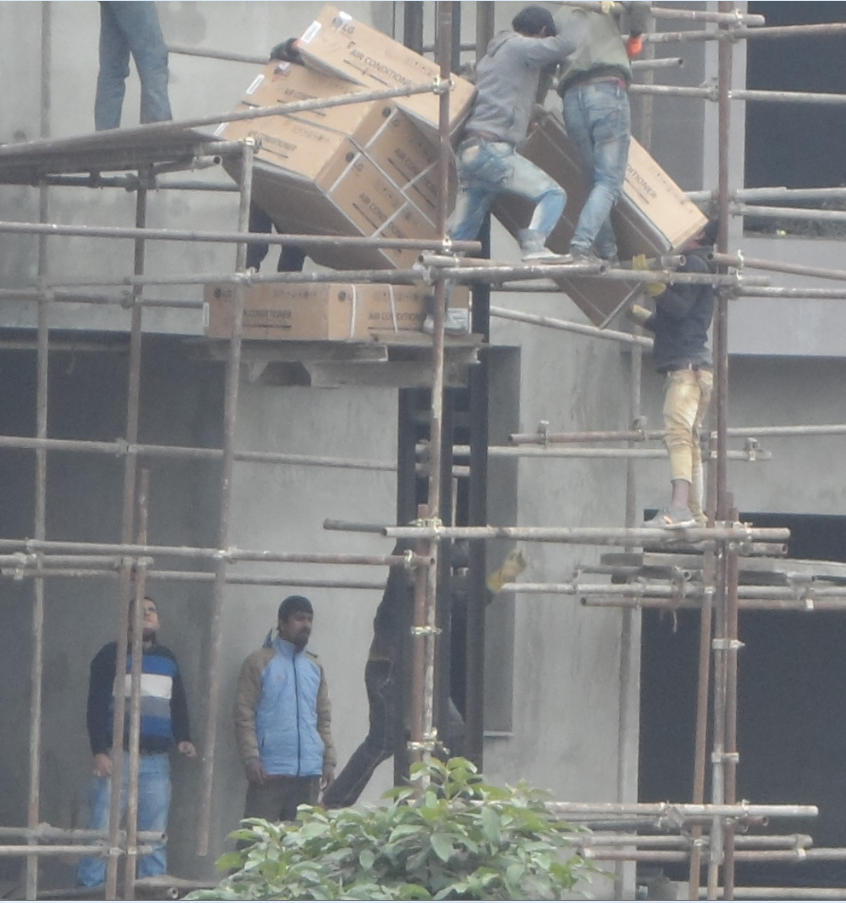
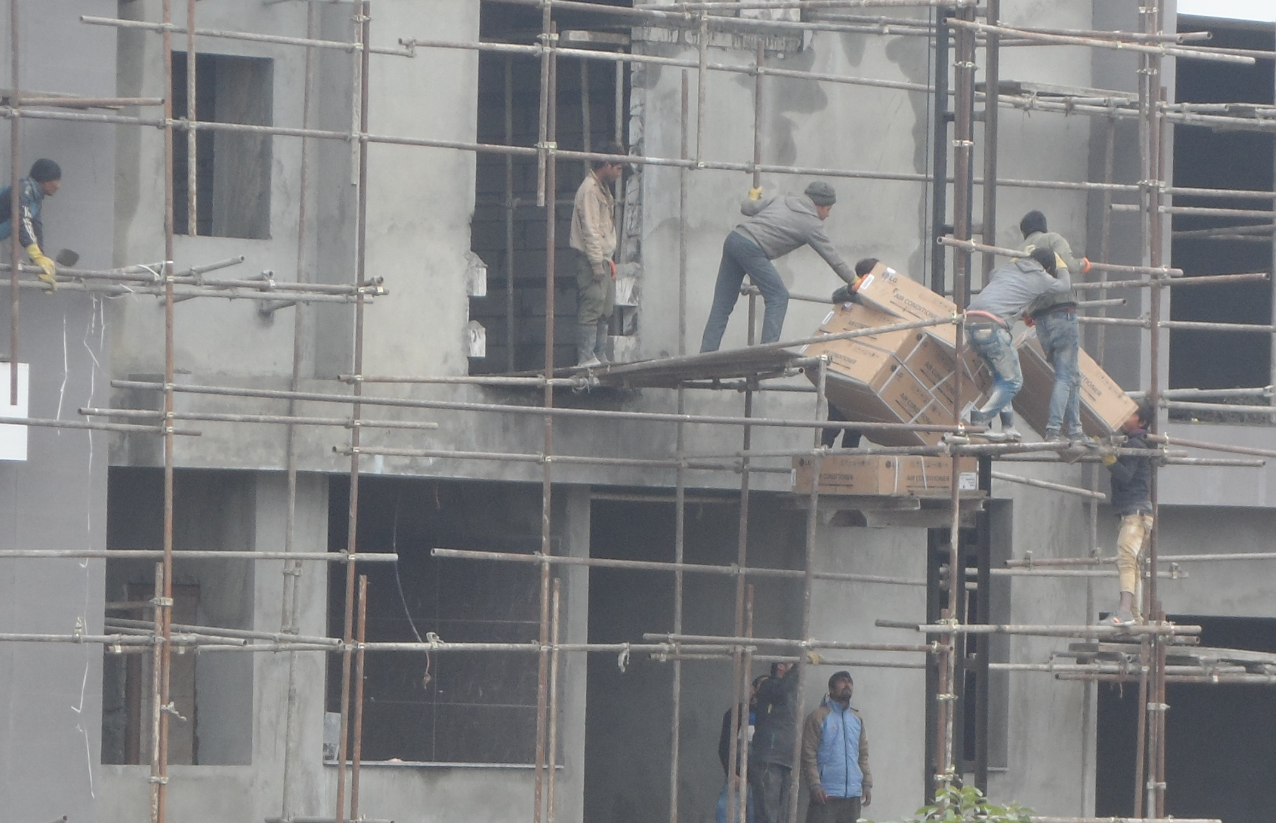
References: